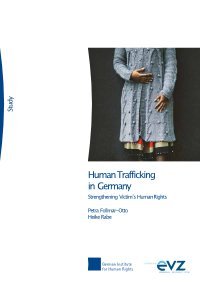By Petra Follmar-Otto Heike Rabe
The idea that human trafficking leads to contemporary forms of slavery and that it must be considered a human rights violation has now gained acceptance. At the same time, it can be said that combating human trafficking is still primarily understood and approached as a crime reduction issue. In that context, trafficked persons are seen as sources of information and potential witnesses in court proceedings. However, they play only a marginal role as subjects with their own legal rights. Although the law has long allowed victims to participate in criminal court proceedings as part of an accessory prosecution procedure (Nebenklage) and to claim wages, compensation, and damages for pain and suffering, a corresponding legal practice in Germany has not become established. Advisory services and assistance are lacking, and pragmatic ways to improve the chances of success in court have hardly been tested. This situation is unacceptable from the viewpoint of human rights. Exercising legal rights goes beyond the hoped-for – and often desperately necessary – material compensation and also holds a great deal of symbolic importance for trafficked persons. This is a way for them to regain their sense of being independent subjects, often after having long experienced a total loss of self-determination over their own lives. Active advocacy for one’s own rights offers an opportunity to restore and increase awareness of one’s own self-worth. However, the chances of success are minimal without advice and assistance along this arduous path. The first part of this publication identifies needed im - provements in the way trafficked persons are treated and derives specific policy recommendations from them. The second part discusses options for the creation of a legal aid fund that can provide advisory services and assistance to trafficked persons to increase their willingness to exercise their legal rights and their prospects of success. Supporting measures such as education and information are also included. The German institute for Human Rights hopes that this publication will promote the progress of a human rights approach to combating human trafficking, particularly in German legal practice.
Berlin: German Institute for Human Rights, 2009. 97p.





